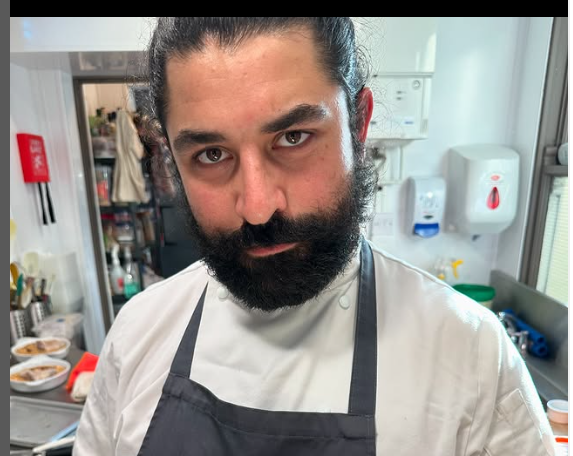Eddie Scott’s regard for roots, legacy, and memory is evident in his choice to open L’Opaline Bistrot in his hometown of Beverley. Scott purposefully rooted his concept in East Yorkshire, creating a venue that seems both ambitious and intimate, in contrast to many chefs who chase after the lights of the city. The name itself is an homage to the individual. Summers in France, he added, introduced him to a cafeteria called L’Opaline, a small place with honest and bountiful rustic food. Scott has preserved the spirit of that childhood inspiration by reviving its essence in a different form, despite the fact that it was destroyed in the early 2000s.

An important milestone was reached on February 12, 2024, when the restaurant license was awarded. It took years of perseverance, cooking, and imagining a space that could combine French culture with Yorkshire sensibility for Scott to refer to it as a “dream come true.” Beverley’s eating scene was immediately revitalized by the debut on May 1, 2024. The rooms exude traditional French coziness with their delicate lighting, rustic wooden details, and vintage-inspired décor. It seems incredibly successful at creating the ideal atmosphere for substantial yet sophisticated cuisine.
Eddie Scott – Bio and Restaurant Information
| Name | Eddie Scott |
|---|---|
| Occupation | Chef, Restaurateur, MasterChef UK 2022 Winner |
| Restaurant | L’Opaline Bistrot |
| Specialties | Rustic French Cuisine, Regional Classics, Hyderabadi Lamb Biryani |
| Address | 36 Highgate, Beverley, East Yorkshire, HU17 0DN |
| Opening Date | May 1, 2024 |
| Contact | +44 7310 487477 |
| Notable Achievement | Winner of MasterChef UK 2022 |
| Reference | MasterChef Official |
Scott’s menu is purposefully limited rather than extensive. In addition to his unique Hyderabadi lamb biryani, which showcases his multicultural influences, diners can anticipate French classics like coq au vin or boeuf bourguignon. This inclusion is especially advantageous since it expands the definition of “authentic.” Respecting tradition while embracing individuality is more important than simply adhering strictly to French cooking. Both local eaters and tourists have found resonance in that equilibrium.
Atmosphere is just as important to the dining experience as flavor. Every service is anticipated because of the short hours and fast-filling reservations. The choice to be small and incredibly effective guarantees that quality never deteriorates. Customers frequently comment that the staff is very clear in describing specials and wine pairings, the quantities are substantial, and the flavors are noticeably better than they expected.
This idea of basing cuisine on memory while maintaining precision is quite comparable to how Rick Stein based his business on Cornwall’s seafood identity or Gordon Ramsay used his childhood meals as a source of inspiration for his work. However, because it is based more on remembrance than on glitz, Scott finds the gesture to be especially inventive. He proves that narrative may be just as essential to cooking as actual materials by re-creating a destroyed French cafeteria in his own eatery.
Since opening, the reviews have been very positive. The restaurant’s social media posts spread its reach much beyond Beverley, and its Google ratings are consistently above 4.5 stars. Customers take pictures of their rustic dishes along with commentary that emphasize how the bistro has made it far less necessary for them to travel to York or Leeds for upscale dining. With food bloggers and influencers excitedly showcasing its dishes, Instagram in particular has developed into a lively extension of the restaurant. Partnerships with local artists increase awareness even further and guarantee that the restaurant’s brand feels contemporary and relevant.
Eddie Scott’s cafe has already garnered praise from the culinary industry. His decision to forgo fine-dining minimalism in favor of a rustic generosity that seems incredibly resilient was praised by fellow MasterChef alumni. Scott’s path puts him in the tradition of chefs who strike a balance between skill and accessibility, such as Raymond Blanc and Angela Hartnett. He avoids the snobbery that can turn off regular diners while maintaining the admiration of critics by doing this.
More generally, L’Opaline Bistrot is a reflection of how local eateries are valued in communities. Due to decreased traffic and the burden of debt, several businesses closed during the epidemic. A promising counterpoint is the opening of a prosperous French cafe in 2024, which serves as a reminder to communities that eating can still have a transforming effect. By providing affordable meals without compromising on quality, Scott has demonstrated how eateries can develop into enduring cultural hubs.
The bistro stays vibrant thanks to its events approach. Weekly specials, such cheese boards or game evenings, increase appeal, while seasonal menus, private dinners, and regional wine tastings provide diversity. In addition to dining, guests take part in activities that link France and Yorkshire. The outcomes have been exceptionally successful in increasing community engagement and attracting return tourists.
The authenticity of Eddie Scott’s journey is equally as captivating as the cuisine itself. His eatery is a symbol of identity, resiliency, and nostalgia. Beverley’s story has been significantly enhanced, and the town now has a destination that enhances its cultural life. Scott sees this as more than just managing a restaurant; it’s about giving shape to a narrative that combines his early memories with his aspirations for his career.
